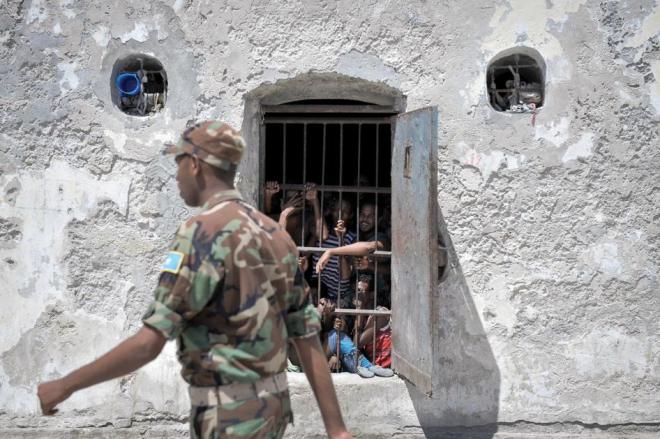
Wednesday May 3, 2017
Somalia’s new government should ensure that the security forces are accountable and improve protection of the most vulnerable people, Human Rights Watch said today in a 10-point report on human rights priorities.
The London conference on security sector reform in Somalia, slated for May 11, 2017, is an important opportunity for Somalia’s leadership and the country’s international partners to make a commitment to address past abuses and improve future responses to the many problems arising from war, famine, and political dysfunction.
On February 8, Somalia’s two houses of parliament selected former prime minister Mohamed Abdullahi Mohamed “Farmajo” as the country’s president following a protracted electoral process. The new government, with support from its international partners, should take concrete steps to remove abusers from the security forces, put a stop to abuses against the country’s over 1.1 million internally displaced people, keep children out of the armed forces, step-up fair prosecutions for sexual violence, and improve media freedoms.
“Somalia’s new political leadership faces many critical problems that urgently need to be addressed,” said Laetitia Bader, Africa researcher at Human Rights Watch. “The government should act quickly to protect all civilians at risk from further violence by holding rights abusers to account.”
Civilians across the country have borne the brunt of the fighting between government forces and the Islamist armed group Al-Shabab, and politicized clan conflict. Warring parties have all committed serious abuses against civilians during fighting and in areas they control.
Somalia’s National Intelligence and Security Agency (NISA) has disregarded detainees’ basic rights, holding people for prolonged periods without charge, denying them access to legal counsel, and extracting confessions through coercion. Current discussions around creating a national security structure have so far overlooked the intelligence services.
The government should clarify the legal mandate of security forces and provide better oversight to ensure redress for NISA abuses.
In recent years, Somali administrations have relied on military courts to try a broad range of cases beyond these courts’ jurisdiction, such as terrorism-related offenses and cases against civilians, in violation of international standards. At the London conference, the government should make a commitment to respect the fair trial rights of all defendants, prohibit trying civilians in military courts, and impose a moratorium on the death penalty.
All Somali parties to the conflict have used children under 18 in their forces in violation of international law, including government forces, despite public commitments not to do so.
The government should establish effective measures to systematically screen the ages of all recruits, including former regional forces and militia members, and cease trying children implicated in crimes before the military courts, which do not apply juvenile justice standards.
With the country on the brink of another famine, the new government has made addressing the humanitarian crisis a priority. As part of those efforts, the authorities should end the serious abuses against displaced people, including illegal forced evictions.
The government should address threats, intimidation, and attacks on journalists that have long posed a threat to a free and vibrant media. It should encourage independent reporting on sensitive issues, such as corruption and security, revise the media law to bring it into line with international standards, and fully and credibly investigate threats and attacks on journalists.
The government should also establish an independent and strong national human rights commission.
“Somalia’s international partners should support key reforms aimed at providing justice for serious abuses and bringing meaningful change for Somalia,” Bader said. “They should direct their assistance to ending abuses against civilians, building accountable security forces, and working with the government to assist the country’s most marginalized communities.”